ERA Country Report 2023
Belgium
Edited by Claire Nauwelaers (Independent Science, Technology and Innovation policy expert)
as part of ‘Development of the ERA Scoreboard, the ERA Dashboard and the Regular Reports’ project for the European Commission, Directorate-General for Research and Innovation under Framework Contract N° 2018/RTD/A2/OP/PP-07001-2018 Lot 2 (EDAR)
Click here to download this country report![]()
- Table of contents
-
ERA Country Report 2023: Belgium
1. National context
1.1. Overview of the ERA policy agenda implementation
1.2. Policy context
2. Assessment of the Implementation of the ERA Policy Agenda and ERA Priorities
2.1. ERA Priority 1: Deepening a truly functional internal market for knowledge
2.2. ERA Priority 2: Taking up together the challenges posed by the twin green and digital transition and increasing society’s participation in the ERA
2.3. ERA Priority 3: Amplifying access to research and innovation excellence across the Union
2.4. ERA Priority 4: Advancing concerted research and innovation investments and reforms
3. Country-specific drivers and barriers
4. Final remarks
5. Bibliography
6. Annexes
6.1. Annex 1: Graphs
Era Country Report 2023: Belgium
|
Key takeaways:
|
1. National context
1.1. Overview of the ERA policy agenda implementation
Belgium as a whole has committed to all ERA actions. However, since there is a division of responsibilities for ERA actions according to institutional responsibilities of the various federated entities and the federal authority (Belspo) operating in full autonomy, not all of them are committed to all actions. Within the frame of their responsibilities for economic development, only the three Regions commit to Action 12 on accelerating the green and digital transition of industrial ecosystems, while the Communities subscribe to Action 4, the issue of research careers as this is delineated by their respective exclusive competences. Together, all entities forming the Belgian R&I landscape show a full commitment to the entire ERA policy agenda.
As an ‘Innovation Leader’, Belgium is part of the top league in the 2023 European Innovation Scoreboard (EIS).
1.2. Policy context
Belgium is a federal country where responsibilities, budgets and policy instruments for research and innovation have been devolved to its 3 Communities and 3 Regions, with the Federal State retaining some competences without having authority on the federated entities and the federal authority. Regulatory frameworks, strategies and actions relevant to the ERA objectives co-exist in all entities, each according to its autonomous competences. Boldly summarised: the Regions are competent for R&I for economic development as well as for research related to their competences and support research institutions, companies, organisations and programmes for these purposes; the Communities are competent for education and scientific research at universities and university colleges and for research related to their competences (culture, education, health, etc.) and are responsible for funding the Higher Education system, in which universities are the dominating actors; the Federal State has its own Federal Scientific Institutes active in federal matters such as space, defence and cultural heritage and is also responsible for federal tax incentives for R&D. In 2021, 81% of total government budgetary appropriations for R&D (GBARD) originated from Communities and Regions.
Key R&I policy and strategy documents setting out high-level priorities relevant to the ERA policy agenda are found in each of the federated entities and the federal authority in Belgium. They generally emphasise an increased role for R&I to address societal challenges and their governments’ priorities: this is notably the guiding principle of Belgium’s national and regional Recovery and Resilience Plan (RRP). Without being exhaustive, the following can be cited: At the federal level, the 2022-2024 Strategic Plan for the Federal Science Policy Office emphasises its open data and open science strategy and a new role for citizens in federal scientific institutions. Flanders’ ambition is to climb amongst the top five in the European Regional Innovation Scoreboard; in this region, a new innovation model is adopted, following a mission-oriented innovation policy, placing greater emphasis on participative ‘quadruple helix’ processes, and administrative reforms are planned in order to achieve better synergies between policy domains. In Wallonia, the Smart Specialisation Strategy provides a backbone to support R&I and new Strategic Innovation Initiatives (IIS) have been defined to operationalise the strategy, with an important emphasis on new skills for societal challenges. Efforts are continuing to reform the Walloon innovation support system. A central strategy for the Region of Brussels-Capital is its 2021-2027 Smart Specialisation Strategy with the aim to tackle environmental, social, and economic challenges through innovation, prioritising skills, digitalisation and the green transition. The Wallonia-Brussels Federation places priority on open science and harmonisation of the legal framework for research careers.
2. Assessment of the Implementation of the ERA Policy Agenda and ERA Priorities
This section covers the main efforts deployed by Belgian authorities to implement the ERA Policy Agenda. The key sources for this section include Belgium’s latest European Semester Report, Belgium’s country page from European Innovation Scoreboard, contributions from Belgium to the OECD STIP survey, ERA actions fiches for Belgium compiled by the Federal Science Policy Office, key documents at federal level and for each Region and the two main Communities.
It includes four sub-sections, one for each of the main ERA Priorities. For each Priority: a first part provides a description of the initiatives relevant to all ERA actions by all Belgian federated entities and the federal authority; and a second part summarises the most recent data available as evidence for evolutions observed from the quantitative indicators of the ERA Scoreboard and ERA Dashboard (to be found in Annex 1). However, in some cases, the data available pre-dates the ERA Policy Agenda. This report will serve as a baseline for reporting in the future. Therefore, the longer-term trends covering the last ten years are presented. The indicators falling under each ERA priority are presented below, and the general indicators are outlined in Table 1. More detailed information on the data and graphs can be found in Annex 1.
| Indicator |
Most recent EU average |
Most Recent Metric |
| Gross Domestic Expenditure on R&D (GERD) as a percentage of GDP |
2.26 (2021) |
3.22 (2021) |
| Government Budget Allocations for R&D (GBARD) as a share of GDP |
0.76 (2021) |
0.73 (2021) |
| Researchers (in full-time equivalent) per million inhabitants |
4,483.4 (2021) |
6,604.4 (2021) |
| Business Enterprise expenditure on R&D (BERD) as a percentage of GDP |
1.49 (2021) |
2.4 (2021) |
Source: compiled by research team based on the ERA Scoreboard and ERA Dashboard indicators
2.1. ERA Priority 1: Deepening a truly functional internal market for knowledge
2.1.1. State of play in the implementation of the ERA Actions
ERA Action 1: Enable Open Science, including through the European Open Science Cloud (EOSC) is a strong priority in Belgium. The European directive on Open Data, which includes publicly funded scientific research results, has been transposed to Belgian law. Open Data and Open Science (OS) are mainstreamed in federal level programmes, by notably rewarding these practices in proposal evaluations. A federal law for ‘secondary publication rights’ allows authors of scientific publications to retain their authors’ rights notwithstanding contractual requirements. Rendering the said publication public by depositing it in a recognised Open Access repository can therefore no longer be contested by the publisher. Federal Open Science policies are being crafted and reviewed by the Federal Open Access Strategy Committee. The federal authority also coordinates the OS consultation commission involving the Regions, and manages Belnet, the Belgian National Research and Education Network, providing OS services, such as the Federal Scientific Institutes with the Orfeo federal Open Access repository and a Data Management Plan template and disseminating OS good practices to the research community. At the federal level, there is also support and guidance regarding the integration of the Federal Scientific Institutes in EOSC. Flanders develops and maintains the Flanders Research Information Space containing the Flemish Open Science Board, publicly funded, which advises on open science policy measures. All Flemish universities have data stewards to exchange experiences and build best practices, and report on Flanders’ KPIs on Open Science, Open Access, DMP and Open Data. Additionally, as collected through the EOSC 2021 Survey, the Flemish Research Data Network (FRDN) is a key initiative to exchange and reuse (FAIR) research (meta)data.
Finally, the Flemish Open Science Board and the Flemish Open Science Policy have been identified as best practices by EOSC as use case of co-creation of Open Science policy and Key Performance Indicators (KPIs). The Brussels-Capital Region has since 2022 also embarked on the development of an ambitious new package of measures on open data and open access. The Wallonia-Brussels Federation (WBF) has updated its OS Roadmap in 2021, extending the focus on Open Access to publications to other dimensions of OS - in particular Open Research Data and Data Management Plans, with FAIRification of data and participation to EOSC as important targets. Work is going on to incorporate OS practice in evaluation of researchers. The F.R.S. and FNRS Fund are currently reviewing its open access policy to implement the decree issued by the WBF on this matter. According to the current Fund rules and regulations, recipients of new fundings from the F.R.S.-FNRS or associated funds, commit to submitting a data management plan (DMP) written in the same language as the research plan. Additionally, in October 2023, the F.R.S.-FNRS has launched its project to develop a public web platform harvesting publication data from the 6 WFB universities.
On ERA Action 2: Propose an EU copyright and data legislative framework for research at federal level, the Belgian Science Policy Office (BELSPO) reports to the Federal Public Service of Economic Affairs, responsible for copyrights, based on consultations with its Federal Scientific Institutions. All Flemish universities are active in international networks and/or projects and have internal committees that work on copyright, open access legislation and open science.
Belgian Communities and Regions are active in ERA Action 3: Reform the Assessment System for research, researchers and institutions. The Wallonia-Brussels Federation, through its main research funding agency, the National Fund for Scientific Research (Fonds de la Recherche Scientifique - FNRS) has endorsed the Declaration on Research Assessment (DORA), the Coalition for Advancing Research Assessment (CoARA) and participates in EU expert groups on research evaluation to incorporate relevant principles in its funding tools. Flanders’ research institutions are reviewing their practices and regulations concerning selection, promotion and evaluation procedures for staff and project funding applications, in line with the DORA principles. Its research funding agency, Research Foundation - Flanders (Fonds Wetenschappelijk Onderzoek - Vlaanderen - FWO) participates in DORA, CoARA, and to the Science Europe Working Group on research assessment. Ongoing evaluations of Flemish research policy instruments and actors such as the Strategic Research Centres, include efforts to incorporate new practices for research assessment. In Brussels-Capital Region new criteria is introduced in project evaluations, in line with the Region’s goal to direct all public support for businesses towards socially and ecologically responsible activities by 2030.
ERA Action 4: Promote attractive research careers, talent circulation and mobility is another priority, especially for the Belgian Communities. Universities hold the Human Resources Strategy for Researchers (HRS4R) label and are part of European University Alliances and share information on research careers. Flanders has adopted the ‘Flemish Framework of measures to support young researchers’ and the FWO specifically targets its support towards inter-sectoral mobility of junior researchers, while improving its procedures to achieve more diverse researcher profiles. Another priority is to better prepare doctoral students for a career outside the academic world, as the Flemish Agency for Innovation and Entrepreneurship (Agentschap Innoveren & Ondernemen – VLAIO) that supports young researchers to work. Improving and promoting research careers remains high on the agenda of the Wallonia-Brussels Federation. Funded by the WBF and integrated in the F.R.S.-FNRS, the Observatory of Research and Scientific Careers was set up in 2018. The Observatory aims to track and analyse the careers of researchers in the FWB through surveys and data cross-referencing. In addition, it develops knowledge on the doctoral and postdoctoral processes, and offers recommendations to facilitate the job transition of PhD holders. Another programme is "TEAM Mentorat” to promote the careers of future PhDs.
ERA Action 5: Promote gender equality and foster inclusiveness is subject to attention and initiatives by all Belgian federated entities and the federal authority. Gender equality has been integrated as a criterion into the investment projects of the Belgian Recovery and Resilience Plan. Additionally, authorities and research performing organisations are involved in networks and projects on gender equality and inclusiveness and R&D Funding agencies have adopted or are developing gender equality plans. Belgian authorities, research performing organisations (RPOs) and research funding organisations (RFOs) are involved in European networks and projects on gender equality and inclusiveness. Most of them have also adopted gender equality plans. At the federal level, all federated entities on gender equality policy in R&I, including for the ERA forum subgroup on Gender Equality, are coordinated within the international and inter-federal coordination mechanism, CIS-CFS Gender. Flanders’ Strategic Research Centres are all active on gender and inclusiveness, through initiatives as VITO. Imec, the Flemish interuniversity microelectronics research centre, has an inclusive workplace policy since 2021. Similarly, the Flemish Interuniversity Council VLIR has working groups on gender and on diversity. The Brussels-Capital Region’s Regional Innovation Plan 2021-2027 incorporates the development of a gender and equality policy. The Wallonia-Brussels Federation created two committees dedicated to gender, the Women and Science Committee, and the Gender Commission in Gender Education. It has also established a network of Contact Persons for Gender in the French-speaking universities and in the RFO for the French-speaking Community. Finally, it has introduced a Commission on Gender in Higher Education, which oversees the implementation of gender policies in HEIs. It has established a network of Contact Persons for Gender in French-speaking universities and introduced new selection criteria about gender equality in its funding schemes for science communication projects. Wallonia’s recovery plan includes a priority action on strengthening employment and studies in STEAM, in which the gender dimension is mainstreamed.
Belgian commitment to ERA Action 6: Protect academic freedom in Europe can be illustrated through the engagement of Flemish universities into activities such as hosting scholars at risk, organising seminars and a survey to academic staff on the topic, preventive screening of institutional collaborations, and the inclusion of a ‘human rights clause’ in all institutional agreements. The academic freedom issue is also covered in the work of the Superior Council for Scientific Integrity in the Wallonia - Brussels Federation inaugurated in 2021.
ERA Action 7: Upgrade EU guidance for a better knowledge valorisation is a long-standing priority in Belgium, at the core of R&I policies of all 3 Regions. This is evidenced by the choice of knowledge valorisation as one priority for the Belgian Presidency and the preparation of Council Conclusions on the topic for 2024. All Regions are deploying a whole range of instruments, such as support to technology transfer offices, collaborative research grants, start-ups and spin-off support, science-industry mobility schemes, clusters etc., which vary in design, size and implementation modalities between the three authorities. The challenge of better valorising knowledge in SMEs is emphasised across the country. Reforming the regional policy mixes to better cover the whole innovation value-chain and higher TRL levels is on the agenda too, with e.g. Flanders developing a framework for reinforcing pilot and demonstration plants and Brussels-Capital putting priority on testing labs and living labs. Universities themselves are also active with e.g. Wallonia’s support to the LIEU network of French-speaking universities’ technology transfer offices providing a step-by-step interactive guide on knowledge transfer for their researchers. University colleges are part of the movement, they have jointly created Synhera, a non-profit organisation funded by Wallonia, the Wallonia-Brussels Federation and Brussels-Capital, which provides training and support in a variety of topics including on research results valorisation. The federal authority is enhancing its support to Federal Scientific Institutes to improve their valorisation practices by offering guidance on research related areas. The policy framework in Flanders puts a new emphasis on increasing the involvement of Flemish companies in strategic basic research, technology transfer offices and research infrastructure.
On ERA Action 8: Strengthen research infrastructures the federal authority, through BELSPO, pays membership fees to large-scale research infrastructures, the European Strategy Forum on Research Infrastructures (ESFRI) research infrastructures and to large intergovernmental organisations such as the Intergovernmental Panel on Climate Change (IPCC), for the benefit of the whole Belgian research community. Additionally, all federal entities engage with the international and inter-federal concertation group on research infrastructures (CIS Infra) with the purpose of coordinating the various perspectives. To better steer its participation in international research infrastructure, Flanders has set up a cooperative ‘Europe Platform’, which notably covers the issue of research infrastructures’ needs and opportunities for universities and research centres. While Flanders has orchestrated funding lines to co-fund access to large research infrastructures, the Wallonia - Brussels Federation is planning a Big Science Fund for this purpose. The latter authority is preparing a joint ESFRI “roadmap” together with Wallonia.
Concerning ERA Action 9: Promote international cooperation, science diplomacy, cooperation and mobility activities are deployed by all entities in Belgium, in full autonomy. It is supported by BELSPO’s efforts towards coordinated approaches for awareness raising on research and knowledge security and regarding engagement in multilateral initiatives. BELSPO pays particular attention to reciprocity and the creation of a level playing field in bilateral cooperation agreements/activities and is committed to responsible and sustainable international cooperation in line with values and principles in the 2022 Marseille Declaration. Additionally, the federal level and Flanders participate actively in the Multilateral Dialogue process with 3rd countries and the Team Europe initiatives on China and Africa. The development process of the European Science Diplomacy is well followed, with active participation in the strategic WG 1, from end 2023 onwards. A key domain for international cooperation at federal level is space research: Belgium was one of the founding members of the European Space Agency (ESA) and is currently its fifth largest contributor. Flanders also participates in the ERA sub-group on science diplomacy; FWO is committed to responsible and sustainable international cooperation in line with principles in the 2022 Marseille Declaration; and Flemish universities have a screening procedure in place for potential high-risk collaborations that are handled by an internal ethics committee. The Wallonia-Brussels Federation has adopted in 2020 a strategy articulated around three themes: 1) diplomacy for science to foster scientific cooperation; 2) science for diplomacy, making use of scientific cooperation to improve international relations; and 3) the use of science to support diplomatic action. All federated entities and the federal authority coordinate their perspectives on the topic in the international and inter-federal coordination mechanism, CIS Inter, which is facilitated by the federal authority.
2.1.2. Progress towards achieving ERA Priorities
With respect to Sub-priority 1.1: Open Science, in line with the openness of its R&I system, Belgium consistently performs ahead the EU-27 average with respect to the share of publications available in open access (Figure 5 in Annex 1).
When looking at Sub-priority 1.2: Research infrastructures, Belgium registers a 0.97% in terms of the share of national public R&D expenditure allocated to European research infrastructures 2022, standing below the EU average. However, the picture is more positive regarding the participation in European research infrastructures in 2021 (Figure 6 in Annex 1), where Belgium stands well above the EU-27 average.
Concerning Sub-priority 1.3: Gender equality, Belgium displays a mixed picture. The country lags behind EU-27 achievements with respect to the presence of women in the research system, this gap with EU-27 having remained constant over the last decade. The gap is somewhat larger for the share of women in grade A positions in HEIs than for the proportion of women among doctoral graduates by narrow fields of Science, Technology, Engineering and Mathematics (STEM) (Figures 8 and 7 in Annex 1). However, regarding the contribution of Belgian women in scientific work, the performance is better than EU-27 average with respect to mixed authorship, and similar to EU-27 average with respect to quality of publications, as measured by the proportion of women in authorships of the top 10% most cited publications (Figure 9 and 10 in Annex 1 correspondingly). The ‘Women in Digital Index’ displays no significant difference between the Belgian and EU-27 average situation in 2022 (Figure 11 in Annex 1).
Under Sub-priority 1.4: Researchers’ careers and mobility and research assessment and reward systems, Belgium is successful in attracting foreign doctorate students, even though the situation is volatile from year to year and the share of these students has never reached the peak achieved in 2015 when more than 50% of doctoral students in Belgium were of foreign origin, the most recent figures being closer to 25% or 30% (Figure 12 in Annex 1). With the exception of one year (2017), the number of new doctorate graduates per 1,000 inhabitants aged 25-34 in Belgium was stable during the period 2015-2021, around the EU-27 average (Figure 13 in Annex 1). The dynamics of job-to-job mobility of Human Resources in Science and Technology in Belgium tend to decrease compared to EU-27 dynamics over the past decade (Figure 14 in Annex 1).
Belgium is performing very well on all indicators measuring Sub-priority 1.5: Knowledge valorisation. The share of public-private co-publications is much higher than the average share in EU-27, and it is growing faster (Figure 15 in Annex 1). Patenting intensity is also consistently higher than EU-27 average, following a similar stable or slightly downward trend (Figure 16 in Annex 1). The country is well-endowed with business enterprise researchers per thousand employees in industry with a growing number that reached a value of 11 in 2020, compared to 7 at EU-27 level (Figures 17 and 18 in Annex 1). Collaboration between innovating firms and higher education institutions or public/private research institutions is also higher in Belgium than for the EU-27, although figures are decreasing in recent years as compared to the period 2010-2014 (Figure 19 in Annex 1).
Under Sub-priority 1.6: Scientific leadership, Belgium’s performance is high. Its Academic Freedom Index remains on top (Figure 20 in Annex 1) and the quality of scientific publications, measured by the number of scientific publications among the top-10% most cited publications worldwide as a percentage of all publications, is also higher than the EU-27 average, with little variations (Figure 21 in Annex 1).
Trends under Sub-priority 1.7: Global engagement depict a very active Belgian scientific community on the international scene: international co-publications with non-EU partners per 1,000 researchers in the public sector is growing much faster and is about 2 times higher than the EU-27 average in 2021 (Figure 23 in Annex 1). The picture is the opposite for European and international co-patenting in EPO applications at national and EU level, where Belgium’s performance consistently lies below EU-27 average (Figure 22 in Annex 1).
2.2. ERA Priority 2: Taking up together the challenges posed by the twin green and digital transition and increasing society’s participation in the ERA
2.2.1. State of play in the implementation of the ERA Actions
ERA Action 10: Make EU research and innovation missions and partnerships key contributors to the ERA is a key priority for Belgium as a whole. In a 2020 joint paper by all federated entities and the federal authority on the future or ERA, the Belgian position was that “an evolution is needed to take account of new challenges such as the Green Deal, digitalisation and the risk of further health pandemics”. Nowadays, federated entities and the federal authority refer to the Sustainable Development Goals (SDGs) and Regions rely on a participatory process of "entrepreneurial discovery" to define priorities in line with societal challenges. The Federated entities and the federal authority provide representation within the Mission Climate and the coordination of the Belgian position is done in the thematic CIS Mission Climate adaptation and climate resilient cities. Flanders explicitly adopts a mission-oriented innovation policy framework in which R&I efforts are oriented in particular towards Industry 4.0. A concrete implementation is the Flanders Industry Innovation Moonshot initiative, focused on reducing its CO2 emissions and meeting its climate commitments. The Region will also adapt its EU platform to better cover initiatives that span multiple policy domains. In the Brussels-Capital Region, "an important debate is developing around the policy balance. Research, development and innovation (RDI) policy increasingly focuses on developing challenge-oriented, top-down policy instruments”. Concretely, the Region intends to incorporate social sciences increasingly in its R&I support programmes. Wallonia started from societal challenges to build up its Smart Specialisation Strategy (S3). The priority domains translate into 19 Strategic Innovation Initiatives (Initiatives d’Innovation Stratégiques – IIS) with a strong international dimension and supported through a bundle of funding mechanisms. The federal authority adopts “a cross-functional research strategy, based on the search for synergies, to best respond to societal and governmental priorities”, a concrete example being the newly established Belgian Climate Centre, providing climate services to respond to the needs of policy makers and different sectors. The Wallonia-Brussels Federation introduces SDGs into the criterion ‘potential societal impact’ in projects evaluation and F.R.S.-FNRS planned the ClimAX initiative for climate research in 2019. In addition, its Strategic Research Fund is oriented towards research supporting Walloon competitiveness poles, and selection criteria have been adjusted to better capture expected societal impacts. All three regions promote participation in the EU Missions; Brussels-Capital being itself a signatory of the Cities Mission while Wallonia and the Wallonia-Brussels Federation have been fully involved in the Climate Adaptation Mission. All entities participate in EU partnerships, for which an intra-Belgian concertation platform exists to foster synergies.
ERA Action 11: An ERA for green transformation is also at the core of new Belgian R&I policies. Flanders and Wallonia are actively involved in the European Strategic Energy Technology Plan, which has taken up the implementation of ERA Action 11. They are both involved in the SET Plan Steering Group and several SET Plan Implementation Working Groups. In addition, the Belgian Resilience & Recovery Plan focuses on this goal, in particular in supporting Research Infrastructure Projects for Green Hydrogen. At the federal level, the Strategic Research and Innovation Agenda (SRIA) of the ERA Pilot on Green Hydrogen is crucial. BELSPO hosts the Central Secretariat (CS) of the JPI Climate. Since 2011, it has been bringing together major climate research, funding organisations in Europe while strengthening global collaboration via a series of flagship programmes related to Horizon 2020.
Building upon those strategic developments, several members of the JPI Climate have been granted with a new Horizon CSA project "MAGICA" (Maximising the synergy of European research governance and innovation for climate action). The JPI Climate CS together with BELSPO as Research Funding Organisation and with the support of the upcoming new Belgian Climate Centre are expected to implement key tasks of the MAGICA project. Flanders is involved in numerous hydrogen transnational projects, contributes to the Clean Hydrogen Partnership and is involved in several projects in the IPCEI “Hydrogen technologies and Systems”. Additionally, its knowledge and expertise platform in hydrogen (WaterstofNet) coordinates the “Hydrogen Industry Cluster”, including members from Belgium and the Netherlands. Wallonia has defined Sustainable Energy systems and building as one of its S3’s Strategic Innovation Areas, with several Strategic Innovation Initiatives selected to operationalise these priorities. Both Wallonia and Flanders are involved in the Vanguard Initiative network, aiming at developing interregional collaboration based on smart specialisation complementarities, under which a pilot project about hydrogen is launched. The Wallonia-Brussels Federation is setting up an interdisciplinary and "trans-technological" research platform in the field of energy transition with French-speaking universities. In Brussels-Capital, Innoviris is coordinating the Climate City Contract under the EU Smart and Climate Neutral Cities Mission of Horizon Europe, where the goal is to achieve carbon neutrality by 2030. All federated entities and the federal authority coordinate on the issue of the green transition within the international and interfederal coordination mechanism, CIS Climate.
Under ERA Action 12: Accelerate the green/digital transition of Europe’s key industrial ecosystems, within the national Recovery and Resilience Plan, R&I projects will support the green and digital transitions of industrial ecosystems. This will amplify a strong priority in the 3 Regions’ R&I policies, especially Flanders and Wallonia where enhancing competitiveness and sustainability of industry is a top priority. Main instruments in Flanders are its 4 strategic research centres in various domains: Imecimec (nanotechnology/nanoelectronics); VIB (Biotechnology, life sciences), VITO (environment, energy and remote sensing), Flanders Make (smart manufacturing), whose knowledge and technology infrastructure are made available to stakeholders, in particular companies and SMEs. VLAIO, the Flanders Innovation and Entrepreneurship Agency deploys various funding lines supporting research in green and digital transition for the benefit of industry. An initiative from such a spearhead cluster, in which at later stage innovation infrastructure is supported is the Moonshot program, working towards Flemish industries being carbon circular and low in CO2 by 2050. In Wallonia, a reform of the regional research centres is ongoing in view of achieving excellence and optimising their contribution to industry transformation. Industrial technologies roadmaps addressing topics related to circular and low carbon industrial and business models, are being prepared in collaboration with the competitiveness clusters in the framework of the Smart Specialisation Strategy. Digital Wallonia supports digitalisation in SMEs and industry, but also in public sector and by citizens. The Brussels-Capital region’s innovation strategy aims to contribute to the ecological transition towards a zero-carbon region and better resource management through circular economy. R&D projects funded by the region’s thematic calls target green and digital transition. In 2022, the F.R.S.-FNRS set up the WEL-T programme, which aims to promote new and important discoveries with potential applications to foster sustainable transition, a strategic sector for Wallonia, in areas as renewable energy, new materials, recyclable materials and safe production methods.
Concerning ERA Action 13: Empower Higher Education Institutions, both Flemish and French-speaking universities are active members in European Universities. The Flemish Government supports them in their engagement in the R&I agenda of these European University Initiatives with a co-funding for each university and universities of applied sciences and arts. Both Communities are responsible for funding Higher Education Institutions (HEIs), through block funding and dedicated funding lines channels for fundamental and strategic research, which contribute to research excellence at these HEIs.
The goal of ERA Action 14: Bring Science closer to citizens is a top-priority and thus subject to multiple initiatives in Belgium, each federated and federal entity considering this as a vital part of their strategies, and a necessary complement to their new orientation towards societal challenges, as depicted under ERA Action 10. At the federal level work is being carried out on a new approach towards the public by integrating them as stakeholders in the research and development activities of the 11 Federal Scientific Institutions. BELSPO will offer an information and knowledge sharing platform for the projects of the Federal Scientific Institutes. It also publishes a magazine, “Science Connection” aimed at popularising science. In the Region of Brussels-Capital the preparation of the Smart Specialisation Strategy relied on extensive consultations of civil society and the innovation ecosystem and includes a strong commitment to include citizens in STI governance. A new focus is placed on new research methods, such as co-operative and co-creative research that bring together different research actors, including academics, businesses, public bodies and citizens. The Region provides funding for projects that raise awareness on science among young students, women, and weaker and under-represented socio-economic groups. Both Wallonia and the Wallonia-Brussels Federation provide funding for local science awareness actions as well as actions towards the promotion of STEAM (Science, Technologies, Engineering, Arts and Mathematics). Wallonia also diffuses a science popularisation magazine (ATHENA) and supports various science contests. Flanders supports Scivil, the Flemish Knowledge Centre on citizens science with the mandate to develop, test and validate new forms of citizen engagement and empowerment. There were several calls for Citizen Science project proposals since 2018; and in 2020 a new STEM policy plan has been launched: the STEM-agenda 2030, focusing on 'STEM literacy' and aiming at establishing a “STEM Academy” in municipalities. Flemish universities have concluded an agreement with the Flemish administration for their science communication and dissemination activities. The Wallonia-Brussels Federation is also intensifying its communication activities and the promotion of researchers’ activities.
2.2.2. Progress towards achieving ERA Priorities
Indicators under Sub-priority 2.1: Challenge-based ERA actions provide more evidence for the openness of the Belgian R&I system, which allocates significant funding to R&I investments for transnational cooperation in the EU-27: these remain at high level, at the double of the amounts allocated on average by EU-27 countries (Figure 25 in Annex 1). In contrast, all indicators measuring environment-related efforts show a relatively bleak picture for Belgium: environmentally related government R&D budget as percentage of total government R&D remains consistently below the EU-27 average and shows a significant decline between 2017 and 2020, not experienced at EU-27 level (Figure 26 in Annex 1). Belgian investments suggested under the Strategic Energy Technology Plan are markedly trailing behind those performed elsewhere in the EU-27 between 2010 and 2020, however, along time the EU-27 value decreases while the data for Belgium increases and hence, the gap is reduced (Figure 27 in Annex 1). Patents on environment technologies are fewer in Belgium than in EU-27, however the gap has been narrowing down between 2011 and 2018 (Figure 28 in Annex 1). Moreover, as Figure 23 in Annex 1 demonstrates, the Belgian performance in relation to Government Budget Allocations for R&D (GBARD) by NABS in energy; environment; transport, and telecommunications and other infrastructure is lower than the European average in all three aspects. Among them, the investment in energy is the only sector in which the value has increased.
The indicator under Sub-priority 2.2: Synergies with education and the European Skills Agenda, the share of researchers receiving transferable skills training, provides a bright picture: the value of this indicator for Belgium is significantly higher than in the EU-27, though the data show a similar decrease in both cases between 2016 and 2019 (Figure 29 in Annex 1).
Concerning Sub-priority 2.3: Synergies with sectoral policies and industrial policy, in order to boost innovation ecosystems, as already mentioned in section 2.1, investments in R&D are growing faster in Belgium than the average of the EU-27, except for GBARD with values and trends similar to EU-27 average. However, when both direct government support and indirect government support through R&D tax incentives are considered, then Belgium stands again ahead of the EU-27 average, with remarkable growth of public support to R&D in recent years (Figure 30 in Annex 1).
Under Sub-priority 2.4: An active citizen and societal engagement in R&I in all its dimensions, trust in science stands at a lower level in Belgium compared to the EU-27 average in 2021 (Figure 31 in Annex 1). Trends in intensity of research on social innovation tend to be relatively similar for Belgium and the EU-27, with the country’s intensity standing higher than the EU-27 average for the whole period 2010-2021, with peaks in the period 2018-2020 (Figure 32 in Annex 1).
2.3. ERA Priority 3: Amplifying access to research and innovation excellence across the Union
2.3.1. State of play in the implementation of the ERA Actions
In relation to ERA Action 16: Improve EU-wide access to excellence, Belgian authorities are reviewing their R&I support systems in view of raising research excellence and relevance, as well as boosting innovation. The FederalScience Policy has concluded a review of its R&D funding programmes to enhance their effectiveness in the face of budget constraints and has established a new centre of excellence on Climate, joining forces of several of its Federal Scientific Institutes. The trend towards broader multi-disciplinary research approaches will also be fostered by greater cooperation between the Federal Scientific Institutes and universities in all Belgian regions and communities. Another aspect is the Excellence of Science (EOS) programme launched in 2017 to promote joint research between researchers in the Flemish and French-speaking communities, as well as foreign researchers. A priority project for the Walloon Government under the RRP is to structure, optimise or coordinate the service offer of the Walloon research centres in the form of Strategic Innovation Centres (SIC) with a cross-sectoral ambition, creating critical mass in a limited number of priority areas for Wallonia. Mergers and reorganisations of support organisations have been deployed to create a one-stop shop for entrepreneurship, innovation, and financial support for businesses. The Brussels-Capital Region is also working on establishing integrated excellence research centres focused on Artificial Intelligence and on cancer research. In Flanders, the establishment of the Flemish Innovation and Entrepreneurship Agency VLAIO involved the merger of formerly separate agencies to create a single point of contact for companies related to innovation and entrepreneurship.
ERA Action 17: Enhance public research institutions’ strategic capacity is implemented through funding models which increasingly reward performance. Knowledge transfer Offices at universities are funded structurally by the Regions, providing structural support to capacity in research management and knowledge valorisation.
2.3.2. Progress towards achieving ERA Priorities
Concerning Sub-priority 3.1: More investments and reforms in countries and regions with lower R&I performance, the Belgian figures on increase of total R&D expenditure expressed as a percentage of GDP show that particular efforts have been made by the country to increase its overall R&D intensity during the period 2016-2020, exceeding the 3% threshold in 2019. In 2021, increases have been less intense than the EU-27 average (Figure 33 in Annex 1).
2.4. ERA Priority 4: Advancing concerted research and innovation investments and reforms
2.4.1. State of play in the implementation of the ERA Actions
Advances in ERA Action 19: Establish an ERA monitoring system rely on data and information to be provided at national level. In Belgium this information is collected by each entity separately, and the differences in capacity between the responsible organisations result in differences in production of such data and information. The official body is the Belgian Statistical Office, Stabel. For official data, the federal level is organising the inter-federal concertation and compilation of statistics at the level of the country. However, for other data, such systematic mechanisms are not yet developed.
2.4.2. Progress towards achieving ERA Priorities
The indicator for Sub-priority 4.1: Coordination of R&I investments, the share of public R&D expenditures financed by the private sector is consistently higher in Belgium than the average in the EU-27, and these figures do not display strong variation over time (Figure 34 in Annex 1). This is in line with previous data on the extent of public-private linkages in R&D in Belgium.
3. Country-specific drivers and barriers
Belgian’s main drivers towards contributing to the ERA include a well-performing R&I system with a strong science base in leading universities and strategic research centres active in frontier research with high impact, well connected to large companies of all origins performing research at international scale, and to innovative start-ups and spin-offs. Another key driver entails the tradition of openness not only in trade but also in science and research with excellent integration at the heart of EU networks, coupled with genuine commitments to EU orientations providing ample opportunities to reap benefits from participation in European and international projects. Finally, high decarbonisation challenges faced by the densely populated and industrialised country are another driving force, as solutions need to be developed in partnership with R&I actors in other EU countries.
A possible barrier for Belgian’s contribution to ERA is the intrinsic difficulty to create synergies between visions and actions of the various federated entities and the federal authority, as cooperation only flourishes based on voluntary ‘concertation’ processes. There is also a conundrum in translating new challenge-driven and mission-oriented orientations of current policy frames into existing sets of policy instruments framed in a historic context: path-dependency and the need for a certain degree of stability in the R&I support system hamper a move towards more radical policy transformation. The last identified challenge, highlighted in the European Semester Report 2023, entails a general lack of human resources in STEM as well as a “lack of relevant skills for the green transition creating bottlenecks in the transition to a net zero economy”.
4. Final remarks
Belgium as a whole has committed to all ERA Actions. Belgium has made remarkable progress in those ERA dimensions where the country is strong, as overall R&D intensity, scientific leadership, the degree of openness and internationalisation, research infrastructure, share of foreign doctoral students, global engagement, and last but not least, the linkages between public and private sector, both in terms of scientific output and innovative outcomes.
Progress on two dimensions of the ERA Policy Agenda seems more difficult to achieve: On the one hand, gender equality continues to lag behind EU average according to indicators and, on the other hand, ‘green’ performance is also trailing behind EU average. The summary of current developments shows that a lot is happening on those two fronts, with new efforts towards incorporating gender equality in programmes and organisations and strong incorporation of green transition in the RRP, major initiatives in green energy and increased smart orientation at the level of regional policies with climate and environment featuring as priorities.
The contribution to the ERA Policy Agenda needs to be understood as the combination of actions from 5 different entities acting in autonomy, the sub-national level representing more than 80% of GBARD. Hence, indicators at the national level cannot sufficiently display important differences between the various parts of the country.
5. Bibliography
Belgian Science Policy Office (BELSPO) (2021). Belgian Report on Science Technology and Innovation 2021. Brussels: BELSPO Publications. Available at: https://www.belspo.be/belspo/organisation/publ/pub_ostc/BRISTI/FWB_rapport_2021_en.pdf
CIS-CFS - Commission for federal cooperation and international cooperation of the Inter ministerial conference for science policy (2022). ERA actions fiches for Belgium. Commissions ‘Federal cooperation’ and ‘International cooperation’ of the interministerial conference for science policy. Brussels: BELSPO Publications.
European Commission (2023a). Commission Staff working document, 2023 Country Report – Belgium, Accompanying the document Recommendation for a COUNCIL RECOMMENDATION on the 2023 National Reform Programme of Belgium and delivering a Council opinion on the 2023 Stability Programme of Belgium, SWD(2023) 601 final. Available at: https://economy-finance.ec.europa.eu/system/files/2023-05/BE_SWD_2023_601_en.pdf
European Commission (2023b). European Innovation Scoreboard 2023. Country profile Belgium. Luxembourg: Publications Office of the European Union. Available at: https://ec.europa.eu/assets/rtd/eis/2023/ec_rtd_eis-country-profile-be.pdf
European Commission / OECD (2023). STIP Compass Belgium Overview, generated from https://stip.oecd.org/stip/interactive-dashboards/countries/Iceland on 25 July 2023.
O'Neill, G. and Martziou, S. (2022). Data of Survey on National Contributions to EOSC 2021. EOSC Observatory. Available at: https://doi.org/10.5281/zenodo.7431678
Neidenmark, T., O'Neill, G. and Karasz, I. (2023). EOSC Catalogue of Best Practices. EOSC Observatory. Available at: https://doi.org/10.5281/zenodo.7574165
General covering all federated entities and the federal authority
Cabinet du Secrétaire d’Etat à la Relance et aux Investissements Stratégiques, en charge de la Politique Scientifique (2023). Plan national pour la reprise et la résilience Belgique – Nationaal Plan voor Herstel en Veerkracht België- National Recovery and Resilience Plan – NRRP, available at https://nextgenbelgium.be
Federal
Chambre des Représentants de Belgique – Belgische Kamer van Volksvertegenwoordigers (2020). Exposé d’orientation politique : relance, Investissements stratégiques et Politique scientifique. Beleidsverklaring : Relance, Strategische Investeringen en Wetenschapsbeleid. Chambre, Kamer, 3e session de la 55ième législature, 3e zitting van de 55e Zittingsperiode. Doc 55 1610/ (2020/2021). https://www.dekamer.be/FLWB/PDF/55/1610/55K1610016.pdf
Belgian Science Policy Office (BELSPO) (2022). Management Agreement 2022-2024. Brussels: BELSPO Publications.
https://www.belspo.be/belspo/organisation/about_managAgree_en.stm
Wallonia-Brussels Federation
‘Open Science – Data Management Plan’, available at https://www.frs-fnrs.be/docs/DMP/Guide_DMP_FR.pdf
‘Plan PHARE 20.25’, available at https://www.frs-fnrs.be/docs/FRS-FNRS_PHARE_2025.pdf
Gouvernement de la Fédération Wallonie-Bruxelles (2019). Déclaration de politique communautaire 2019-2024 available at https://gouvernement.cfwb.be/files/Documents/D%c3%a9claration%20de%20Po…
Brussels Capital
‘Regional Innovation Plan 2021-2027’ available at https://innoviris.brussels/fr/plan-regional-innovation
‘Déclaration de politique générale commune au Gouvernement de la Région de Bruxelles-Capitale et au Collège réuni de la Commission communautaire commune 2019-2024’ available at
Wallonia
‘Stratégie Wallonne de Spécialisation Intelligente (S3)’, available at https://s3.wallonie.be/home.html
‘Circular Wallonia’, available at https://economiecirculaire.wallonie.be/fr
‘Digital Wallonia’, available at https://www.digitalwallonia.be/fr/
‘Plan de relance de la Wallonie’, available at https://www.wallonie.be/fr/plans-wallons/plan-de-relance-de-la-wallonie
‘Déclaration de politique régionale 2019-2024’, available at https://www.wallonie.be/sites/default/files/2019-09/declaration_politique_regionale_2019-2024.pdf
Flanders
‘Beleidsnota 2019-2024. Economie, wetenschapsbeleid en innovatie’, available at https://www.vlaanderen.be/publicaties/beleidsnota-2019-2024-economie-wetenschapsbeleid-en-innovatie
‘Flemish Reform programme’, available at https://flandersineu.be/en/flemish-reform-programme-2022
‘Flanders 2050 (VISIE 2050): a long-term strategy for Flanders’, available at https://publicaties.vlaanderen.be/view-file/28831
‘Flemish Resilience Plan’, available at https://www.vlaanderen.be/en/authorities/flemish-resilience
VARIO (2022). Advies 27: Visie op een goede beleidsmix tussen vrije en thematische steun voor O&O in Vlaanderen. Brussels: VARIO publicaties. https://www.vario.be/nl/adviezen-rapporten/advies-27-visie-op-een-goede-beleidsmix-tussen-vrije-en-thematische-steun-voor-o-o-in-vlaanderen-2
VARIO (2018). Memorandum 2019-2024: Forging ahead. Aim: Top 5 knowledge regions. Brussels: VARIO publicaties. https://www.vario.be/en/advisory-reports/memorandum-2019-2024-forging-ahead-aim-top-5-knowledge-regions
6. Annexes
6.1. Annex 1: Graphs
The 2023 ERA Scoreboard and ERA Dashboard indicators used in the country report are presented in this annex. Detailed information on the data sources, description of the indicators, time period for which the data is available, and the necessary calculations can be found in the ERA Scoreboard and ERA Dashboard Methodology Report. The most recent available data for each indicator has been used.
General Indicators
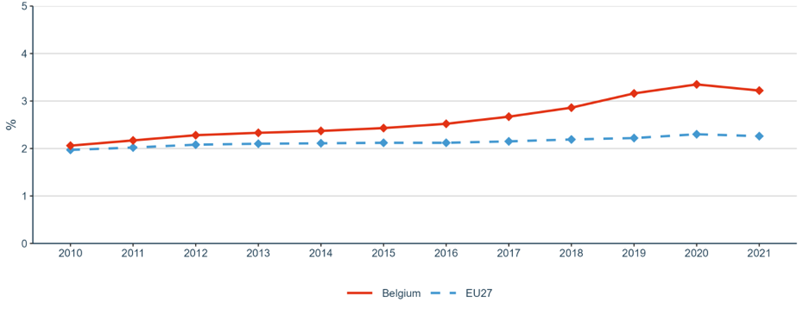
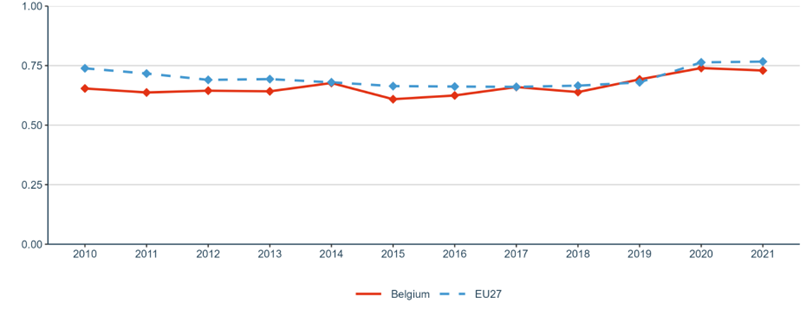

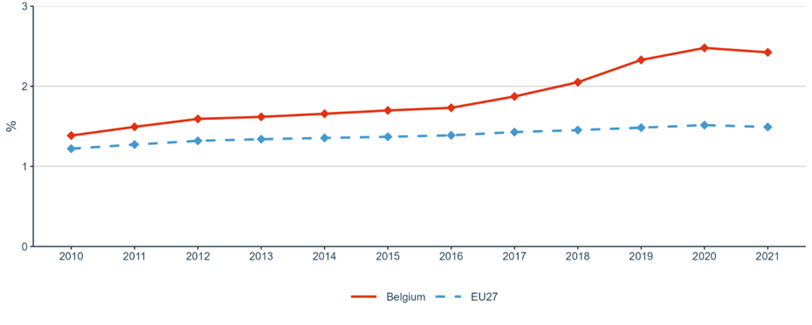
Priority 1: Deepening a truly functioning internal market for knowledge
Sub-priority 1.1: Open Science
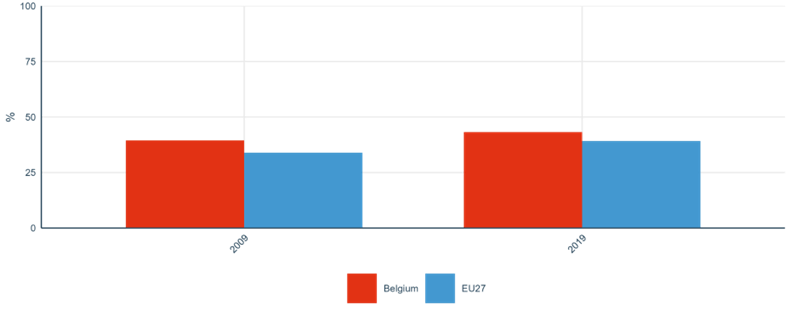
Sub-priority 1.2: Research infrastructures
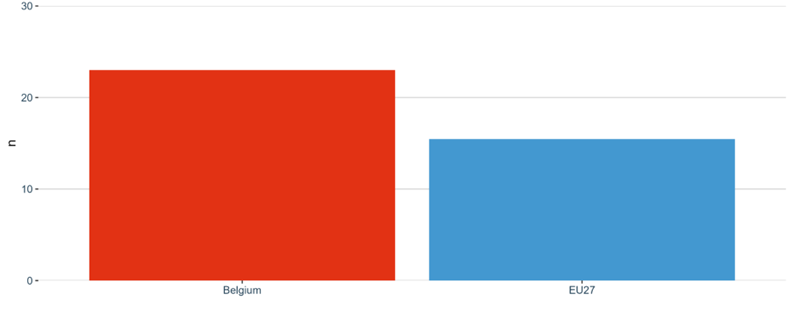
Sub-priority 1.3: Gender equality, equal opportunities for all and inclusiveness
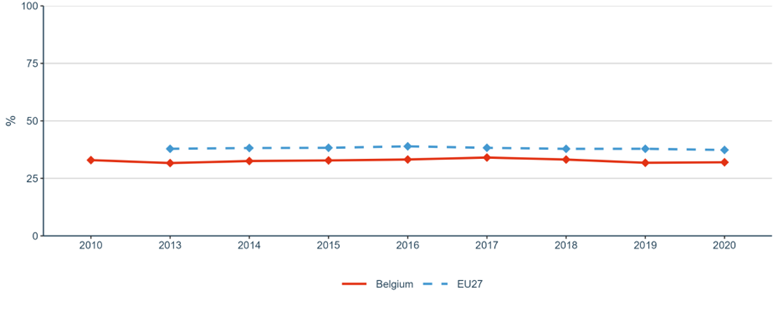
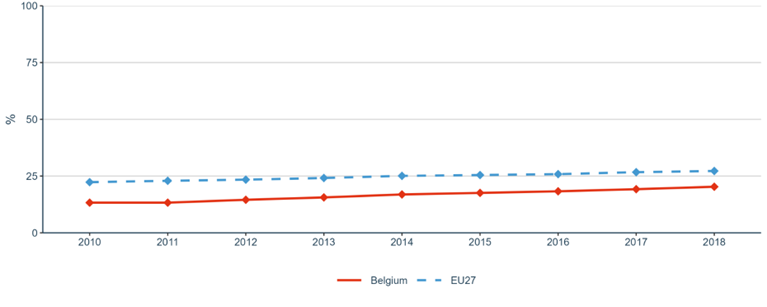
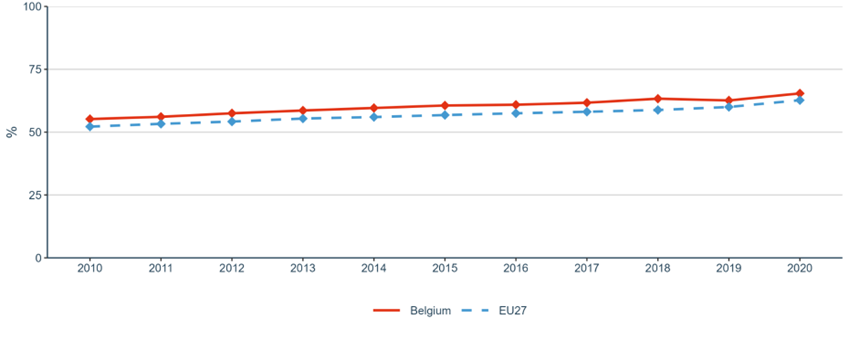
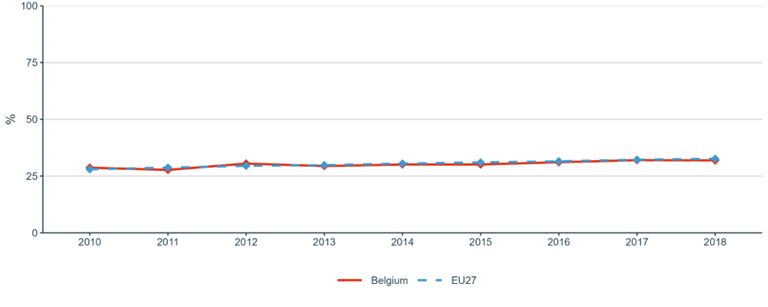

Sub-priority 1.4: Researchers’ careers and mobility and research assessment and reward systems



Sub-priority 1.5: Knowledge valorisation

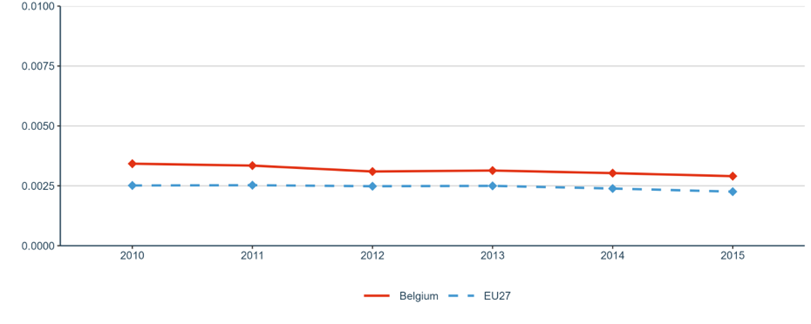
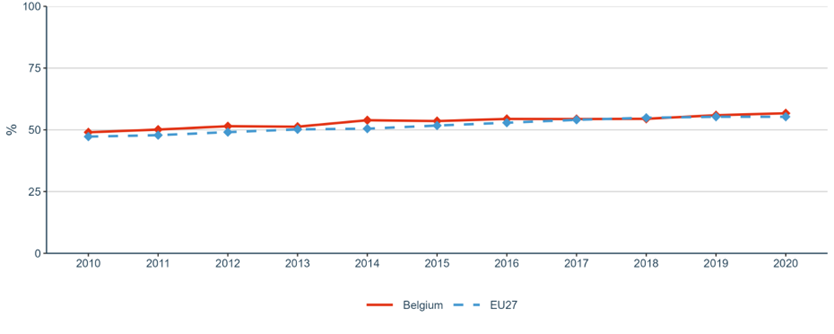
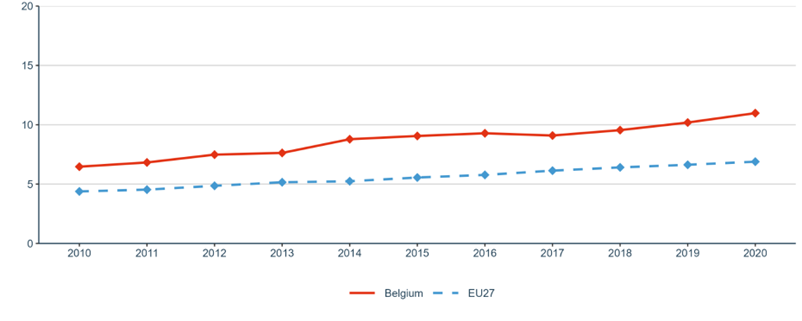
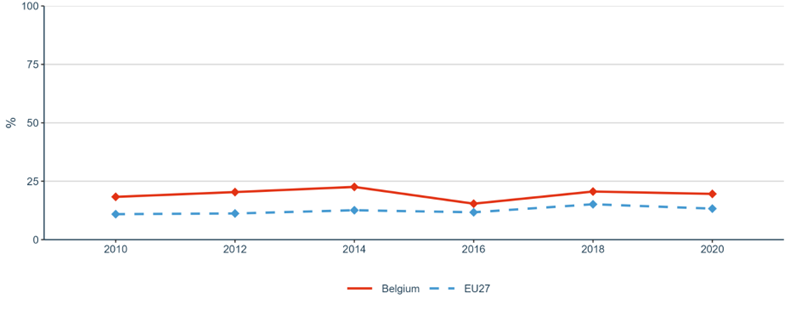
Sub-priority 1.6: Scientific leadership
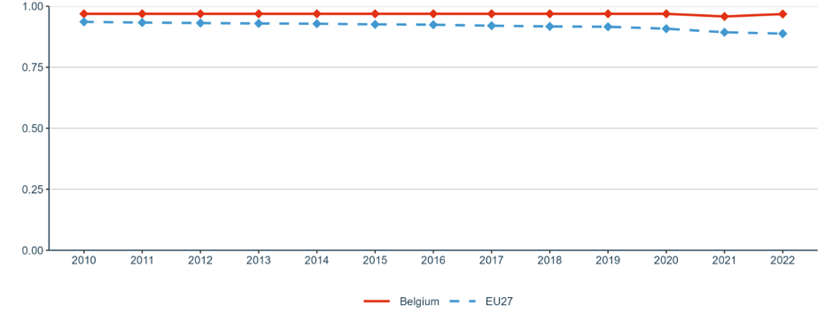
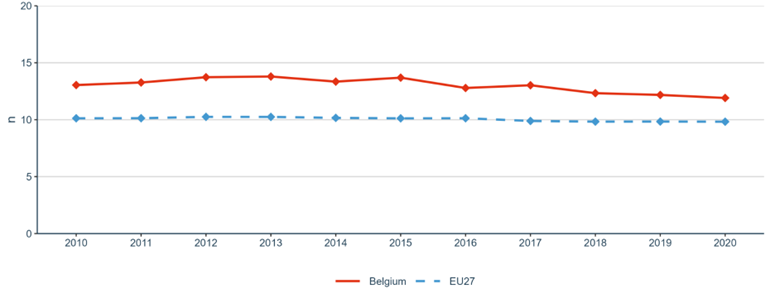
Sub-priority 1.7: Global engagement


Priority 2: Taking up together the challenges posed by the twin green and digital transition, and increasing society’s participation in the ERA
Sub-priority 2.1: Challenge-based ERA actions
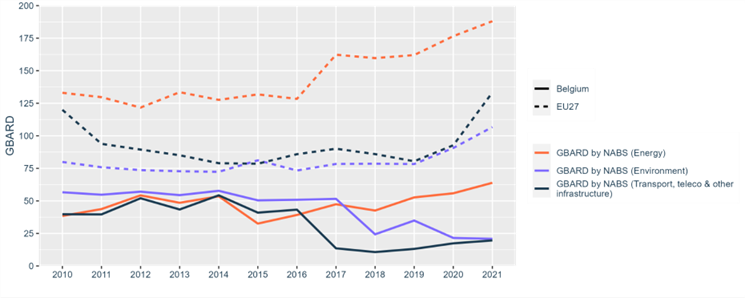
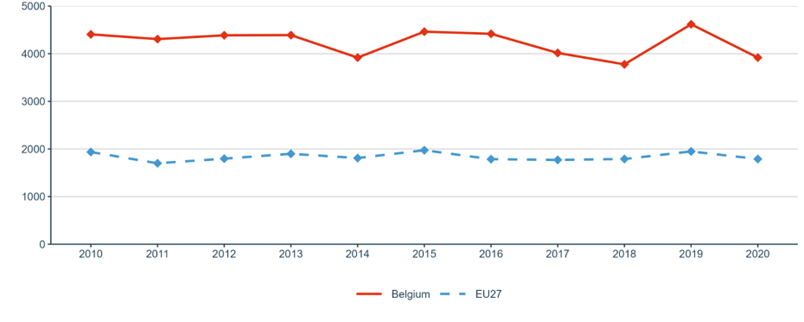

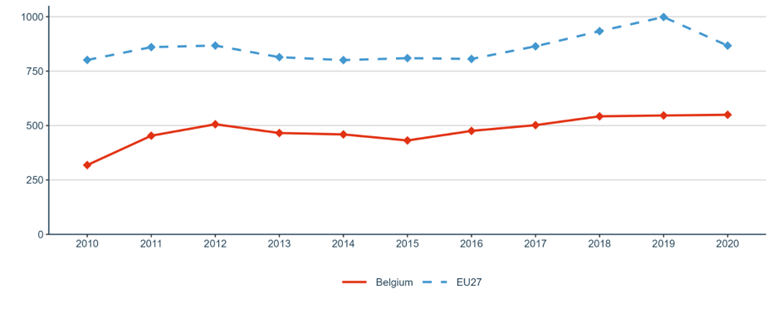
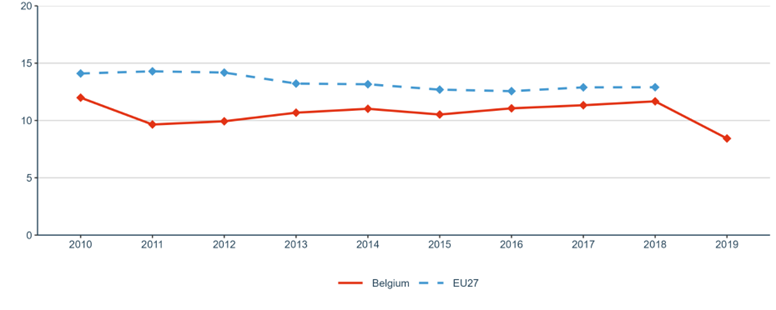
Sub-priority 2.2: Synergies with education and the European Skills Agenda
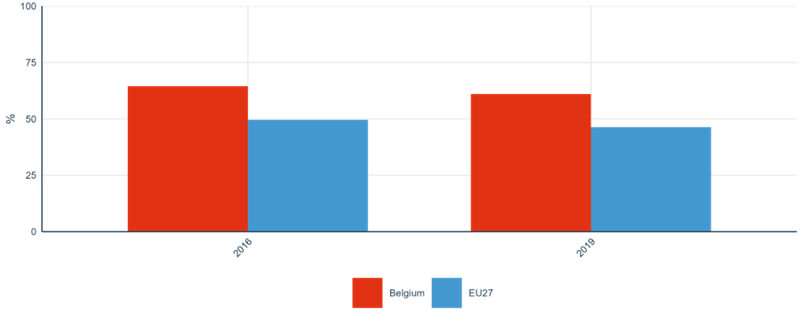
Sub-priority 2.3: Synergies with sectorial policies and industrial policy, in order to boost innovation ecosystems
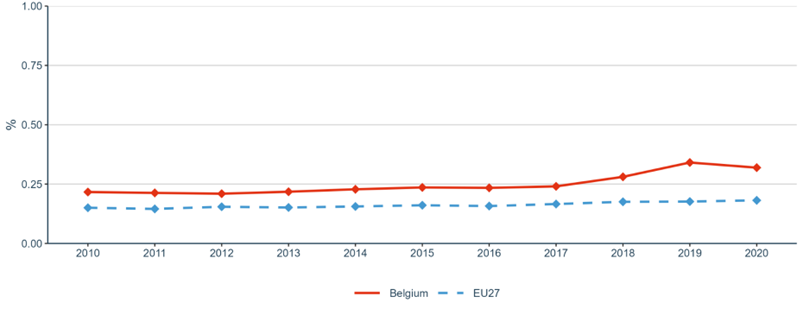
Sub-priority 2.4: An active citizen and societal engagement in R&I in all its dimensions
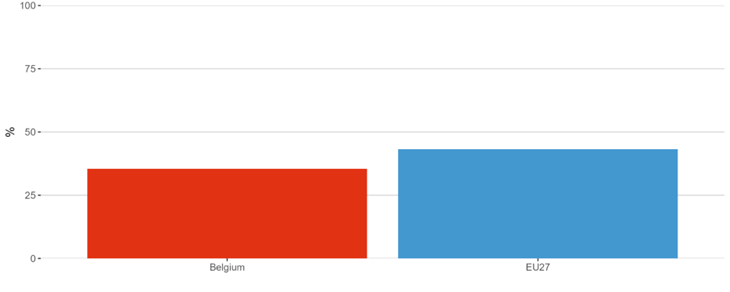
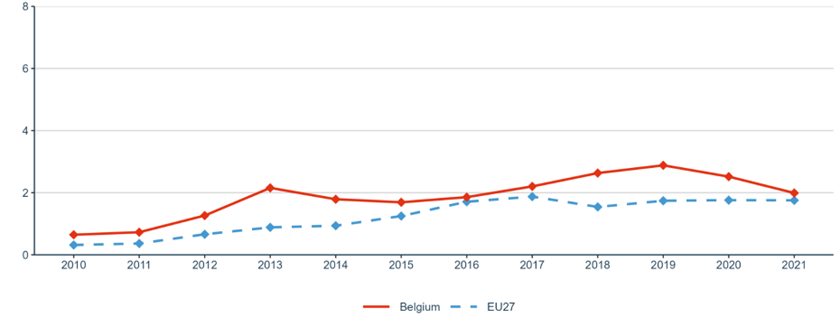
Priority 3: Enhancing access to research and innovation excellence across the Union
Sub-priority 3.1: More investments and reforms in countries and regions with lower R&I performance

Priority 4: Advancing concerted research and innovation investments and reforms
Sub-priority 4.1: Coordination of R&I investments

